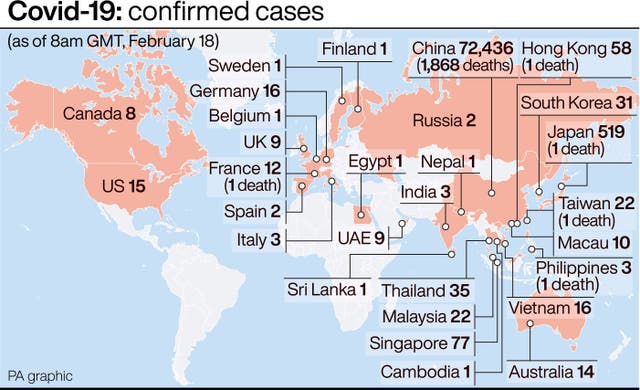
A vaccine against coronavirus could take more than a year to develop, the World Health Organisation (WHO) has said.
Addressing a press conference in Geneva, Switzerland, director-general Dr Tedros Adhanom Ghebreyesus said that preparing a vaccine was planning for the “worst situation”.
But he acknowledged that development was a “balancing act” – adding that the imminent focus should be on public health solutions.
“We have to invest in preparedness and really use this window of opportunity to stay away from any serious crisis,” he said.
LIVE on #Periscope: Daily media briefing on #COVID19 with @DrTedroshttps://t.co/LpvJ3s6mmT
— World Health Organization (WHO) (@WHO) February 18, 2020
“We have to strike a balance. The vaccine could be the long term, because it could take up to 12 to 18 months. And this is like preparing for the worst situation.
“It’s the simple public health solutions that we should do that should really be our focus, while of course preparing for the vaccine.
“That balancing act is very, very important. We do what should be done today and then we invest also in the future to prepare for the future.”
He called the current period of transmission a “window of opportunity that should not be missed”.

Dr Michael Ryan, executive director of the organisation’s health emergencies programme, told the briefing that “many, many” lives could be saved in the coming months – with or without a vaccine.
He said that development would be costly, warning that funds “cannot and should not” be pulled away from helping weaker health systems prepare for the coronavirus, also known as Covid-19.
“This isn’t a trade-off between one or the other. We can save many, many lives in the coming months, with or without a vaccine,” he said.
“We all want to invest in the vaccine as a long-term solution but there are people sick now. There are health systems that are vulnerable now.”
"We’re working with partners in some of the most fragile contexts to prepare countries for the arrival of the #coronavirus. We still have a chance of preventing a broader global crisis.WHO will continue working night & day with all countries to prepare them"-@DrTedros #COVID19
— World Health Organization (WHO) (@WHO) February 18, 2020
He added: “We can save a lot of lives through support of therapy by testing the drugs we’re currently testing, and by getting everything in our systems working. And then we do the other things and you develop the vaccine.”
When asked about vaccine development, Dr Sylvie Briand, director of epidemic and pandemic diseases at the WHO, said a candidate vaccine could be “around 16 weeks from now”.
But she added that there would then be months of tests to decide if any potential vaccine can be used on humans.
“It’s still a matter of weeks – months,” she told the briefing.


Comments: Our rules
We want our comments to be a lively and valuable part of our community - a place where readers can debate and engage with the most important local issues. The ability to comment on our stories is a privilege, not a right, however, and that privilege may be withdrawn if it is abused or misused.
Please report any comments that break our rules.
Read the rules here